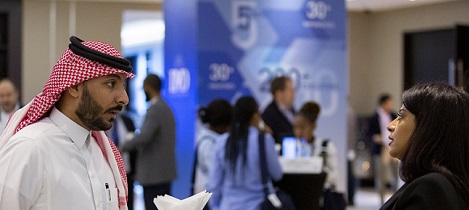Innovation, leadership, agile organizations – and a tech leader who is teaching kids to code. These are just some of the key topics of discussion on day one of Orchestrating Winning Performance (OWP) in Dubai.
The program brings together 150 participants, traveling from 33 countries and from 45 nationalities for five days of interactive sessions, networking opportunities and keynote speeches.
Here are some of the key moments from the first day of OWP.
How human beings learn
Program Co-Directors Jean-François Manzoni, President of IMD, and Professor Tawfik Jelassi, kicked-off the event – the first time it has been staged in Dubai – by discussing the importance of the way humans learn and absorb knowledge.
The key strategies to learning are about curiosity, contradiction and openness, IMD President Manzoni said.
“As we get older and more successful we fall prey to conformity vices. Look for the ideas that are contrary to the ones you have today,” he explained.
“Have curiosity and openness to new ideas. Come away with a few more answers and, hopefully, with a lot more questions.”
We live in a world where too few people continue to make a written note of the information they receive, Professor Manzoni added. The Ebbinghaus Forgetting Curve theory claims that if you learn something new you are, more often than not, going to lose that information. But making notes and reabsorbing information can strengthen the information retention process and increase knowledge recall.
“Neurons that fire together, wire together,” said Manzoni. “And the more they repeatedly fire together the stronger the wiring is.”
“Let’s give every child the gift of a great education”
As the digital revolution gathers pace, Lindiwe Matlali wants to ensure no child – regardless of skin colour or social background – is left behind.
The founder and CEO of Africa Teen Geeks, Matlali created the organisation to eliminate the barriers faced by disadvantaged communities in pursuing an education in science, technology, engineering and math (STEM).
In a keynote speech on how we can inspire the next generation of innovators, South African Matlali shared her journey from a childhood living in poverty to one of the leading figures in tech in Africa.
Matlali created the coding academy Africa Teen Geeks in 2014 – a job “that feeds the soul” – after meeting an eight-year-old coder who had built her own app in the US.
“Every child should have an equal opportunity to get themselves out of poverty. It is very near impossible to break the cycle of poverty … but education is an equaliser.”
To date, Africa Teen Geeks has reached more than 100,000 South African children.
“Let’s give every child the gift of a great education,” she said.
Read more on Lindiwe’s journey here.
Disrupting the disruptors
Some of the most powerful technology companies in the world could soon be challenged by fresh-faced rivals – but change won’t come overnight.
So said IMD Professor Goutam Challagalla in his session which asked – are the world’s biggest tech companies at risk of disruption?
Yes, said Challagalla, but only if those companies looking to “disrupt the disruptors” have the right strategies in place.
Rule number one – change the rules. “If you want to disrupt a market leader, never play by their rules,” Challagalla said, “because they have mastered them. Doing the same thing will only work 5% of the time.”
Traditional methods of differentiation do not work, Challagalla added. If you want to challenge Uber, for example, then you need to fight scale with scale.
While this happens, challengers must focus on the principles of how this disruption could take place. “Don’t focus on the disruptor. Focus on the type of disruption.”
For more on this session, read this full recap here.
Beware the “success trap”
Why is it that so many businesses fail and so few succeed?
Often, many companies fall into the all-too-familiar ’success trap’ – sticking to what they are good at rather than exploring new ideas, said Bettina Büchel, Professor of Strategy and Organization at IMD.
“For many companies, often if they are good at something, they tend to do more of the same,” explained Büchel.
Many companies face a huge challenge – how to maintain business efficiency, productivity and disciplines as well as generating innovation and growth.
Companies need to find the right balance between exploitation (generating cash to support growth) and exploration (finding winning products and models), said Büchel.
For long term sustainable success, exploration is essential. The essential ingredient, said Büchel, is the ability of businesses to launch initiatives and – crucially – to learn from their early implementation.
Read more about this session on here.
What is agility?
At a time when companies are investing heavily in the digitisation of their business models; a hot topic is a need for businesses to be agile.
“But no-one actually has defined what agility is,” said Michael Wade, Professor of Innovation and Strategy as well as Director of the Global Center for Digital Business Transformation at IMD, in his session with participants.
IMD conducted its own research and found agility is not simply one factor but three; hyperawareness, informed decision making and fast execution.
Companies need a triple-pronged attack.
The first is to have the ability to detect and monitor change in a business environment,
Secondly, companies need to have the ability to make the best decision with the facts in a given situation.
Lastly, companies need to turn decisions into fast actionables.
“Sometimes this requires trading off speed with perfection; which for many can be difficult.”
Wade said a simple tool to manage innovation is finding a well-defined ‘transformational ambition’, adding this should incorporate five golden rules; being precise, realistic, inclusive, succinct and measurable.
Watch the recap of day one at OWP in Dubai here.


